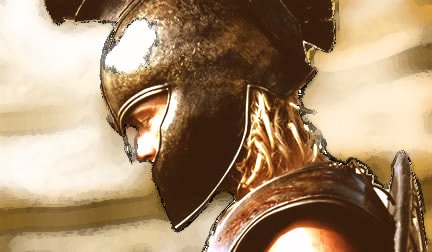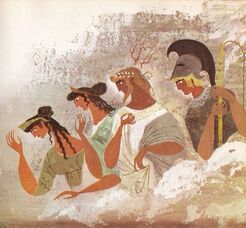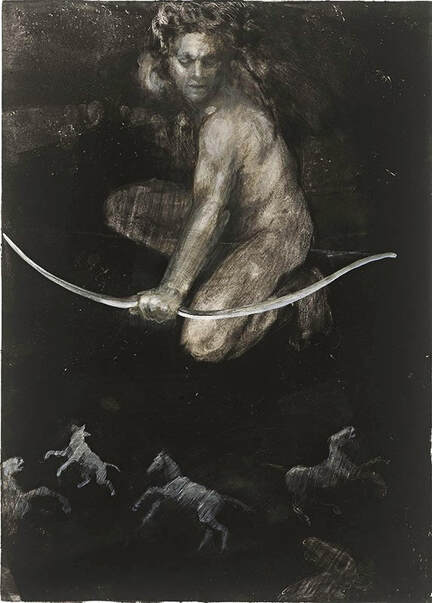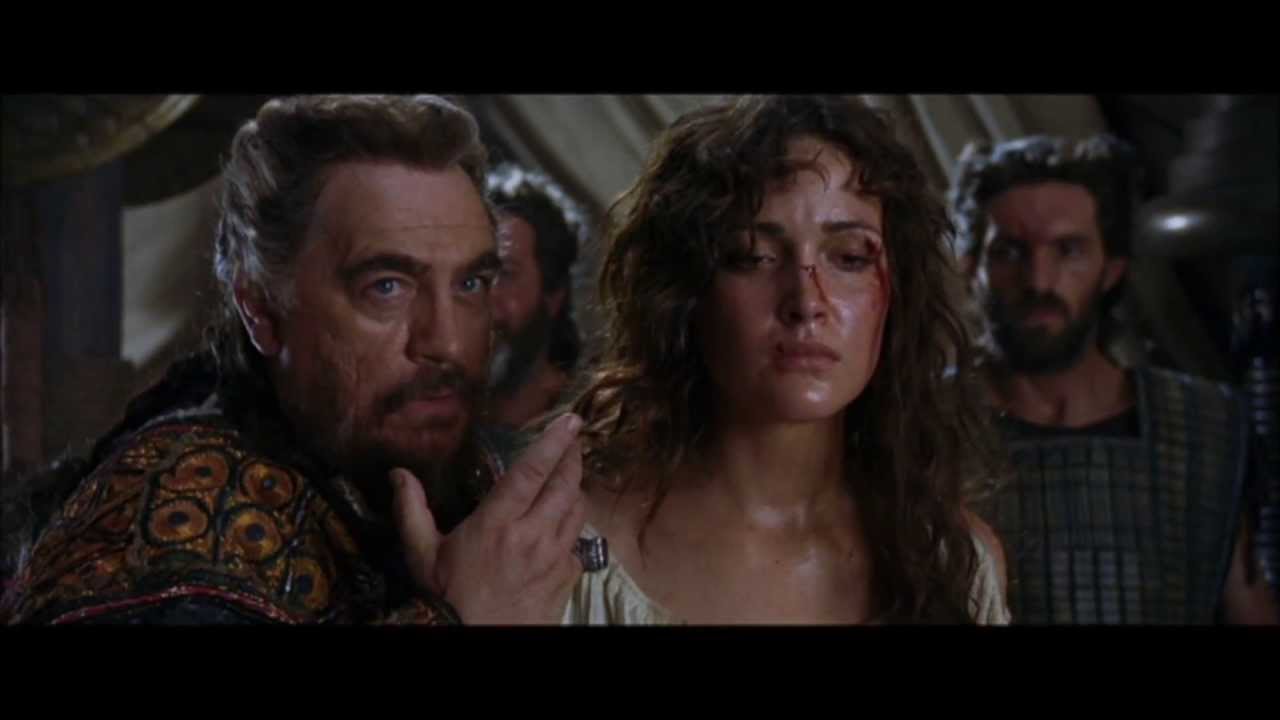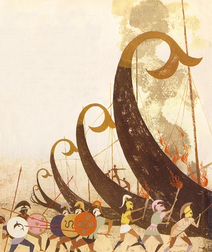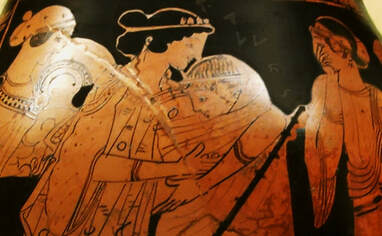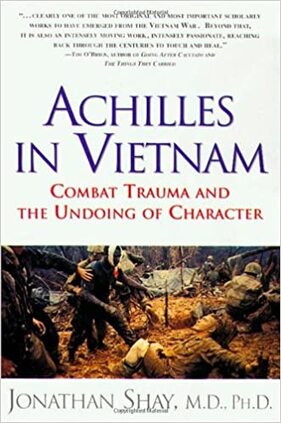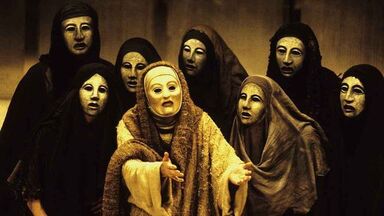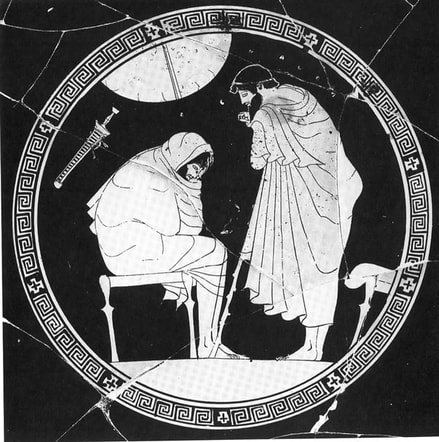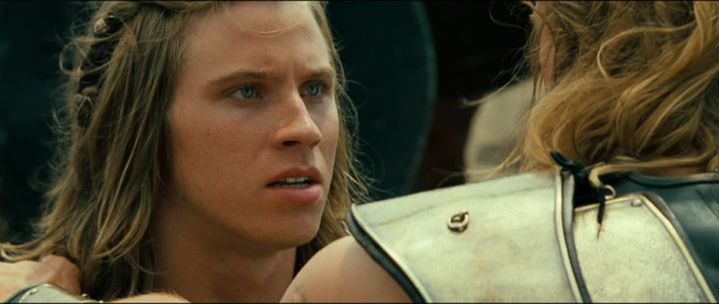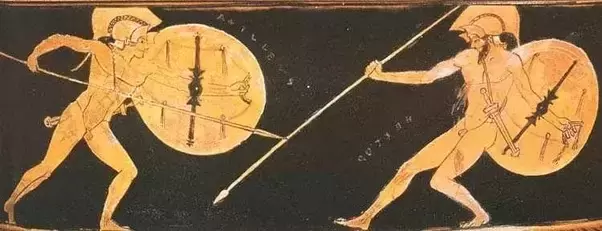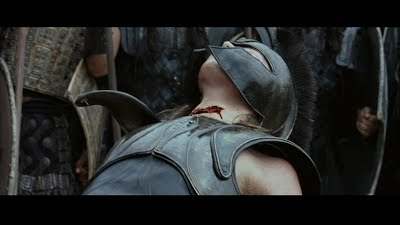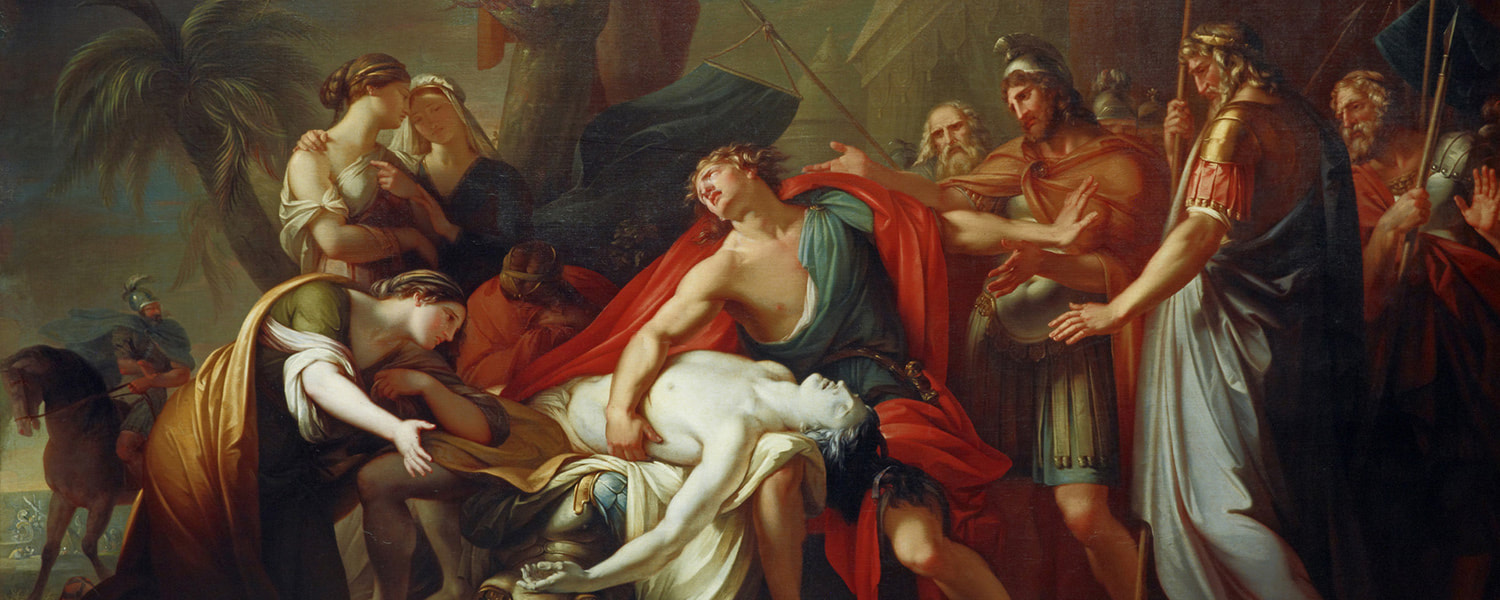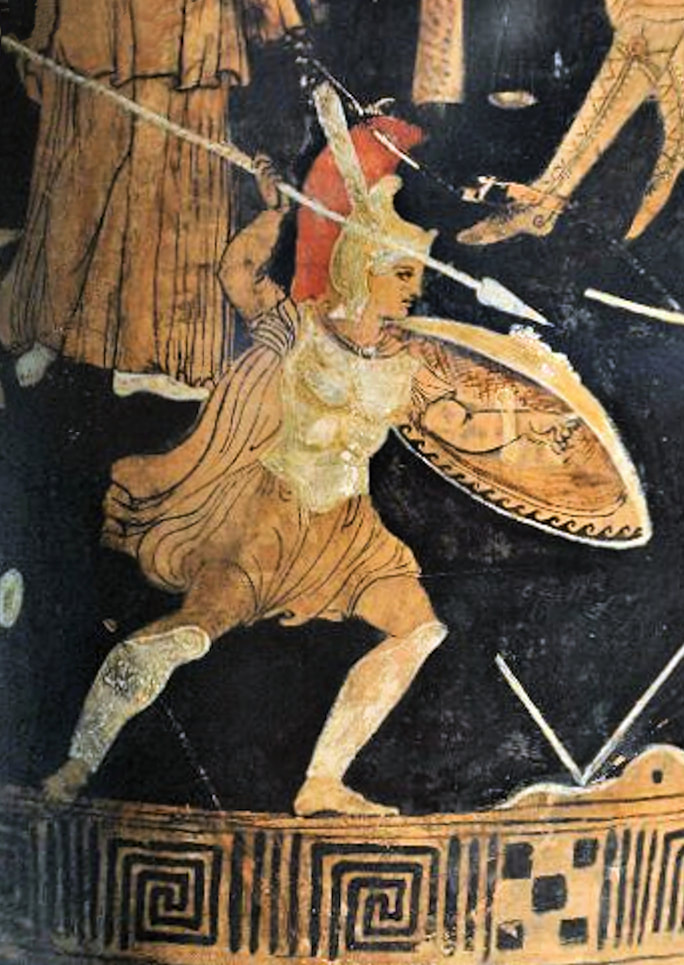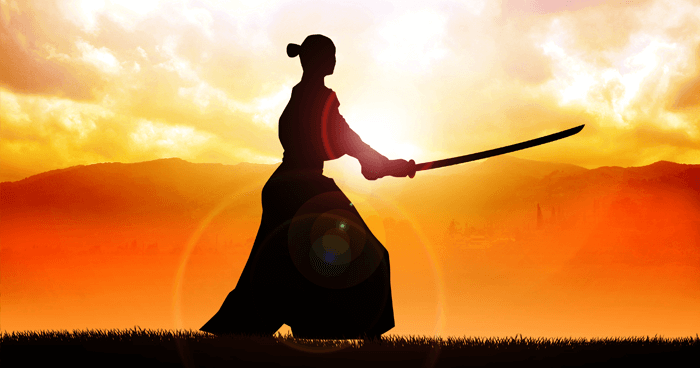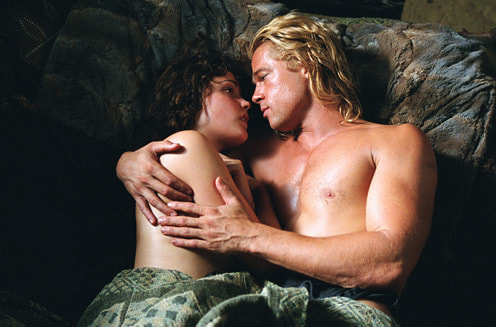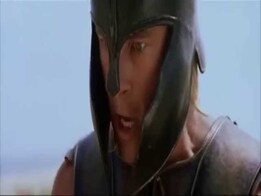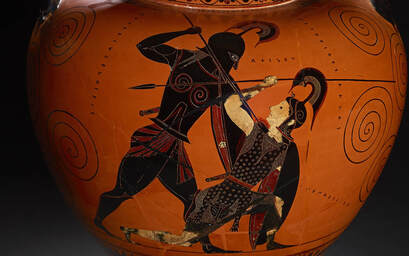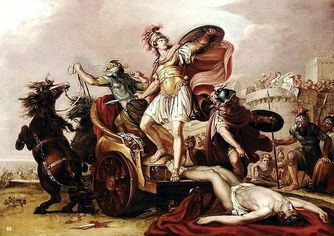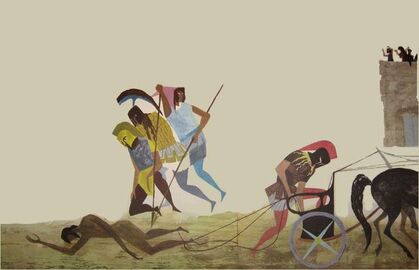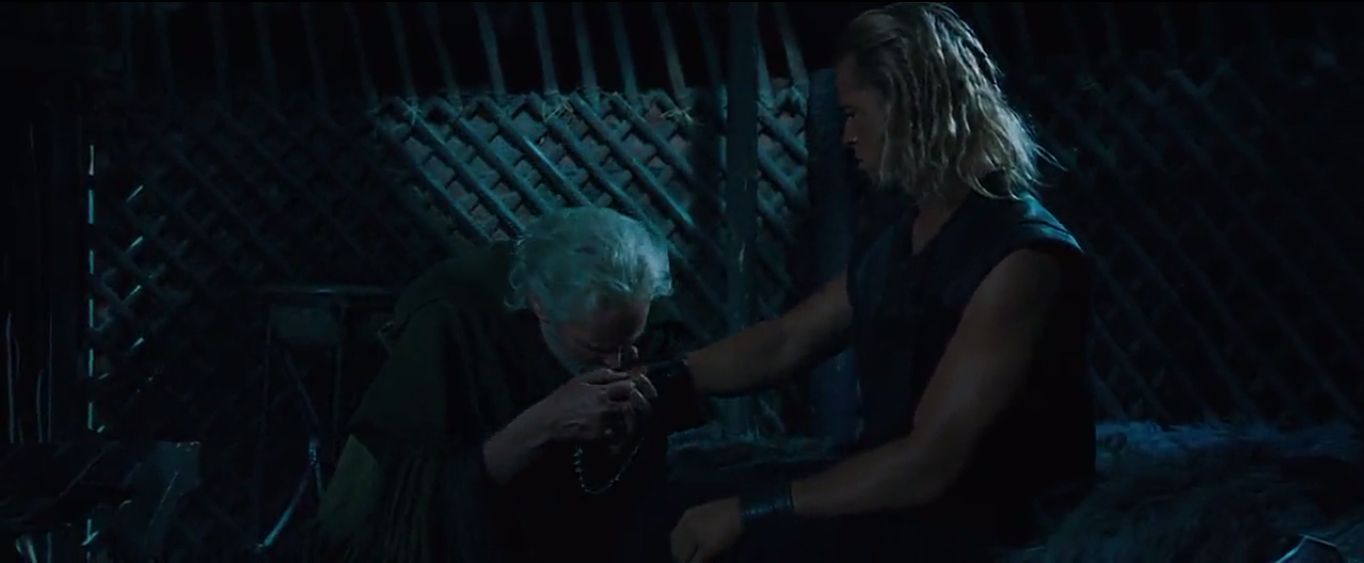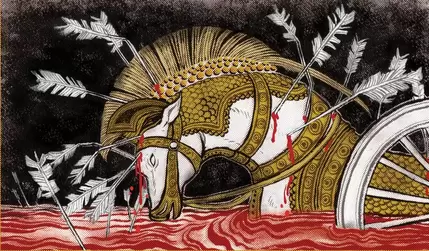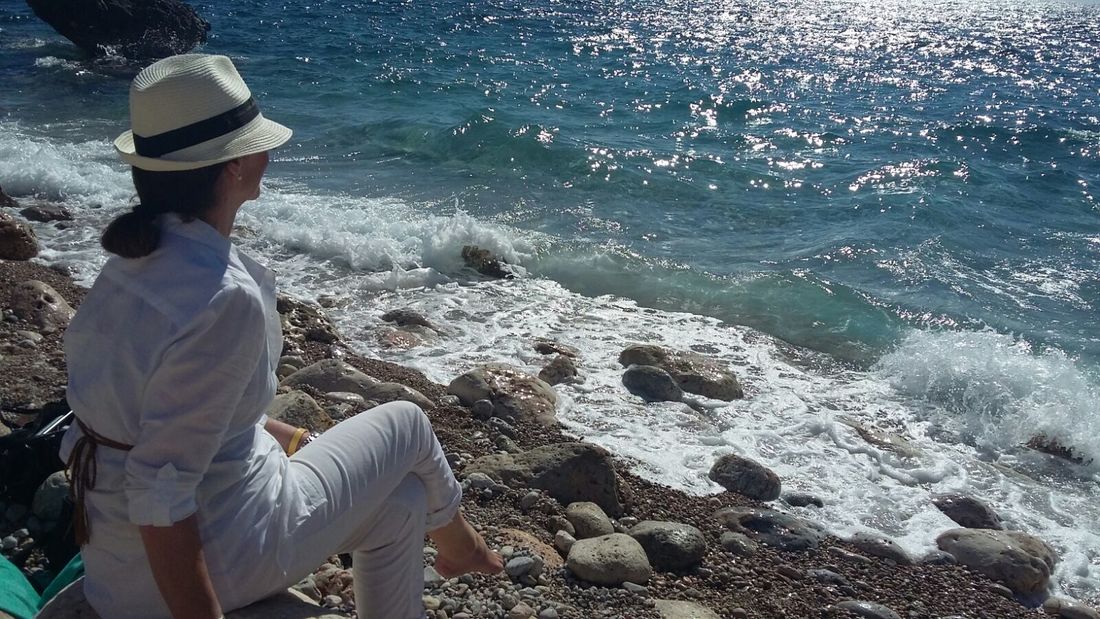The Transformation of Achilles' Rage
Sing oh muse the rage of Peleus' son Achilles,
murderous, doomed, that cost the Achaeans so many good men and sent so many vital, hearty souls down to the dreary House of Death.
Begin. Muse, when the two first broke and clashed; Agamemnon lord of men and brilliant Achilles.What god drove them to fight with such a fury? "
― Homer, The Iliad
What follows is the epic tale of how this affliction came about - how it broke and eroded his character and how it was eventually eased and transformed. Lasting three whole nights in the telling the tale was performed from memory, most frequently to the accompaniment of a lute - and it would have been presumed that listeners were already aware of the main characters and their back stories.
The muse, as always was invoked at the start to illumine what followed. For those were the days (and perhaps they still are) when the affairs of gods and mortal folk were mysteriously intertwined. Zeus, Aphrodite, Hera and Athena are behind the scenes from the start, some say they have even orchestrated the war with Troy & they intervene on different sides throughout along with Apollo & Thetis, divine mother goddess of Achilles. But even behind these great figures stood Eris, goddess of discord who had ignited the flames at the start - but that's another tale for another time.
Now, Achilles had taken the beautiful Besius after one such raid and had come to love her some say, whilst Agamemnon had claimed Chrysius, daughter of a high priest of Apollo who soon after came to the encampment to beg for her release, offering a huge ransom - but when Agamemnon refused - the priest prayed to Apollo that a terrible plague might come down upon Agamemnon and his men until his daughter was returned. And so it was that great Apollo, god of medicine & healing - knower of wounds & also wounding - rained down a flurry of poison arrows upon the encampment - and “his coming was like the night” (1.47)...and the arrows fell....
“ one after the other, and the shafts .....ranged everywhere throughout the wide camp of the Achaeans” (1.382-384).
“...constantly the pyres of the dead burned thick”
(1.52)
....since Phoebus Apollo robs me of Chryses’ daughter, a ship and crew of mine will return her, but I’ll pay your quarters a visit myself, and take that prize of yours, fair-faced Briseis, so that you know how my power exceeds yours.....’
In any event Agamemnon’s failure to acknowledge Achilles' worth - his disregard of his importance - and the claiming of Briseis was a grave insult to the champion, who had fought unwaveringly for this king for nine long years - securing victory's that could never have been dreamed of without him and all the men knew this to be true. And whilst Agamemnon spoke,
the son of Peleus was gnawed by pain, and the heart in his shaggy breast was torn; whether to draw the sharp blade at his side, scatter the crowd, and kill the son of Atreus, or curb his wrath and restrain his spirit.
And when the Trojan's heard they were emboldened - for without the great Achilles, the army of Agamemnon would be greatly weakened - and they began to push hard, forcing the Greeks back to the shoreline where they had first alighted.
Thetis & pleaded with her to punish Agamemnon and his army. He would rather see the Greeks loose altogether it seems than permit Agamemnon to dishonour him further.
Was it love of Briseis, honour, pride, or all of these things put together - and what do his actions reveal? Many commentators focus upon Achilles emotional immaturity in an attempt to understand his rage & withdrawal from the fray but Jonathan Shay, Psychiatrist at the Department of Veterans Affairs, in Boston and author of the acclaimed - Achilles in Vietnam: Combat Trauma & the Undoing of Character - sees it quite differently. With many years experience in treating veterans he suggests that what we are really witnessing here is Achilles' reaction to the violation of a central and universally held moral code of combat conduct.
In dishonouring his mightiest warrior - in publicly taking Briseis - Agamemnon inflicts the most grievous Moral Injury upon Achilles that Dr Shay has seen replicated time and time again in his work. Whilst of course the collective enemy is always a danger to life and limb, he says - the Moral Injuries inflicted by one's own 'side' and particularly by leaders causes far more severe and long lasting damage, than the physical wounds of war, compounding symptoms of PTSD and leading to a far greater incidence of mental breakdown, suicide, substance abuse and domestic violence.
Where there is a failure in military leadership and military ethics he asserts - soldiers experience a catastrophic loss of trust which is not only experienced emotionally - but viscerally too. The body reacts as if under major threat - the heart rate pounds - adrenaline pumps - hyper - alertness is activated - persisting long after the triggering event and from this, the veteran can find no rest - no peace long after the incident has passed.
It is extremely common for such men & women to withdraw within themselves and often literally too - like Achilles. They are acutely aware says Shay, of the danger they pose in this hyper - alert state and remove themselves as a precaution - but often never find their way back home.
In one way of looking we can see that Achilles has been plunged into a kind of existential crisis, a breakdown of sorts. His whole reason for choosing the short life of a warrior has been thrown into question. His entire raison d'être has collapsed. This kind of dissolution of one's previous identity - is very much part of the Hero's Journey as we have seen many times - and it gets worse long before it gets better.
Those who suggest that the tale is simply about the maturation of Achilles - his egotistical thirst for glory - his struggles to overcome pride, his need to stand out - to be remembered in times to come grossly underestimate the level of Achilles maturity before the opening events of the tale to which numerous retrospective references are made throughout - but perhaps more importantly - they completely underestimate the disintegrating impact of the type of Moral Wounding inflicted by Agamemnon.
Don't forget - we are already in the ninth year of the war. Much has been endured but also accomplished and a very large part of this success is due to Achilles' own leadership - his own ethical code. He was well liked, we hear, highly respected, charismatic, skilled at healing the war wounds of his men. In short - he was already a mature warrior - in the sense that Moore & Gillette (link below) have outlined for us. This is Dr Shay's conclusion too - and that of the many, many war veterans he has treated - who we are told, resonate and identify so profoundly with Achilles and his wounds - in spite of the fact that the story was written down in approximately 762 B.C. Some things, as we have seen many times - are universal - no matter time or place.
Theatron being the word referring to the seating area of an ancient Greek theatre.....and,
....from the Greek word for spectators, theatai, the later philosophical term “theory” was derived, and the word “theoretical” until a few hundred years ago meant “contemplating,” looking upon something from the outside, from a position implying a view that is hidden from those who take part in the spectacle and actualize it.
The Life of the Mind: Investigation on How We Think : Hannah Arendt
The idea, in attending such productions - an integral part of Greek life - was to contemplate the matters in question, from a detached position, not just to be entertained or distracted - but in order to learn, to see - through exploration and contemplation - the very nature of the issues - and in this case Achilles' rage. And not just his rage of course - but rage itself - our rage - how and why it came about and how it too can be transformed.
"Fail us now? What grief it will be to you & through all the years to come. No remedy, / know to cure the damage once it's done"
(9.301-3)
Patroclus too had withdrawn from the fight in support of his friend - along with the rest of Achilles' men - but when he saw the Trojans getting the upper hand he lost patience with Achilles and begged him to return to the field.
All our best men lie by the ships wounded by arrow or spear thrust: The healers, skilled in the use of herbs, are busy trying to cure their wounds, while you, Achilles, remain intractable. May such anger never possess me as grips you, you whose useless valour only does harm to all. How will posterity benefit, if you fail to save us from ruin?
....at least let me take the field ....leading the ranks of Myrmidons, .... And let me borrow that armour of yours, so the Trojans might take me for you and thus break off the battle. Then ....we may win a breathing space: there are few such chances in war. We who are fresh might easily drive a weary enemy back to their city from the ships and huts.
Illiad BkXVI
Though for the most part such complicity is unconscious says Critchley - it never-the-less reveals a deeper truth about our participation in the tragedies that befall us. Maybe, in some mysterious way - we all know of such things but cannot face the thought - often projecting blame as far away as we can from ourselves.
... a black cloud of grief shrouded (him). Grasping handfuls of dark sand and ash, he poured them over his head and handsome face, soiling his scented tunic. Then he flung himself in the dust, and lying there outstretched, a fallen giant, tore and fouled his hair.
Bk XVIII:1-77 Achilles’ sorrow
...his divine mother Thetis heard him, deep beneath the sea where she sat beside her ancient Father.....and all the daughters of the deep gathered to her.... (and)...the bright sea-cave was filled with nymphs, beating their breasts,
Bk XVIII:1-77 Thetis responds to Achilles’ sorrow
One after another, they trod the shore, where the ships were beached in lines around swift Achilles. His divine mother reached his side, while he lay groaning there, and with a piercing cry took his head in her hands, and spoke to him winged words of sympathy...
It is very often the death of a soldiers best friend in action that triggers a mental collapse says Shay. This has always been known in the military. A soldier might cope with unimaginably harrowing events and remain relatively intact - but when one's combat partner falls - everything can begin to unravel.
When Achilles returns with Patroclus’s body he is wild with grief. He refuses let the funeral pyre be laid - maybe in a tragic attempt to hold on - maybe in denial of his friends untimely death. Understandable to us all no doubt - for who here can say they might not wish to do the very same thing when the death of a loved one occurs? Who amongst us has the truly uncomplicated capacity to just let go?
But Patroclus later comes to him in a dream - needing to go on - needing to be set free - to go wherever souls must go when life is over - and seeing him appear - Achilles reaches out, longing for his warm embrace - but Patroclus slips from grasp - his beautiful image dissolving into the night air. Only then does Achilles give in, allowing the funeral pyre to be set - and afterwards, in the gleaming new armour his mother has created for him, he mounts his chariot and sets forth to the gates of Troy bellowing Hector's name. And all quivered with fear within - knowing the love between Achilles and the dead Patroclus - and hearing the depths of Achilles fury.... and Hector's wife, knowing what was to come, begged her husband not to go forth.
Desire for revenge utterly possesses the tragic Achilles at this point - revenge & the brutal execution of the warrior Hector who has slain his beloved. And as Homer tells, it will be a revenge without mercy, without honour that will bring him no peace, no relief from his agony.
It is a vital force we all must develop in order to defend our shared and personal values - our boundaries - and to defend and attack where necessary. Such qualities are hard-wired into every human being - from a mother defending her young - to a great warrior destroying a dangerous foe. In everyday life too - for both men and women such energy is a pre-requisite for the execution and satisfactory completion of any endeavour.
"They envy us because we're mortal, because any moment may be our last. Everything is more beautiful because we're doomed. You will never be lovelier than you are now. We will never be here again."
Troy (film): 2004
Achilles, in so many ways is the quintessential hero - part human, part divine - beautiful beyond imagining - courageous - dangerous - bold - impetuous - yet when broken by the deep wounds inflicted upon him fails spectacularly, as is plain for all to see.
"I have endured what no one on earth has endured before. I kissed the hands of the man who killed my son."
(Troy, 2004) Peter O'Toole, Brad Pitt, Priam, Achilles, Homer's Iliad
“Divine Achilles, remember your father who is, like me, on the grievous door step of senility. Maybe he, too, is all alone in sorrow and no one is there to defend him. But when he hears that you are alive, his heart is filled with joy. Because he still hopes that one day he will see his beloved son returning from Troy. But I, I am utterly unblest, seeing I begat sons the best in Troy, yet of them not one is left…”
There is something about the humility of King Priam's approach in the depths of the night - about his willingness to put aside his pride - to kneel at the feet of his enemy and kiss his hands - acknowledging Achilles' great loss - their shared loss - shared grief - and utter brokenness that somehow softens and tempers Achilles' rage. And in that moment some say, the unbearable fury that has caused Achilles' to violate so many accepted boundaries now 'freezes' out of 'respect & compassion' and deep admiration for this frail old man.
“Ah unhappy man, too many are the evils you have endured in your soul. How did you find the courage to come here all alone and meet the eyes of me that have killed your sons? Your heart is truly made of iron! But come here, sit on the throne and despite our pain, let our suffers lie quiet in our hearts. For no profit comes with lament!
… and Priam was admiring of Achilles. He was so great and comely, like a god! But Achilles also was looking at Priam with admiration, for he was so noble and hearkening to his words!
Anne Maria Clarke
x x x
The Iliad: Homer
The Song of Achilles: Madeline
King Warrior Magician Lover: Rediscovering the Archetypes of the Mature Masculine Paperback –1992
by Robert Moore Douglas Gillette
The Warrior Within: Accessing the Warrior in the Male Psyche - Robert L. Moore
Hero Within - Rev. & Expanded Ed.: Six Archetypes We Live by
by Carol S. Pearson |2016
Achilles in Vietnam: Combat Trauma and the Undoing of Character Paperback – 1995
by Jonathan M.D. Shay
Tragedy's Philosophy, Simon Critchley
https://youtu.be/tv3j9U0g0qQ
https://twitter.com/MariaClarke
